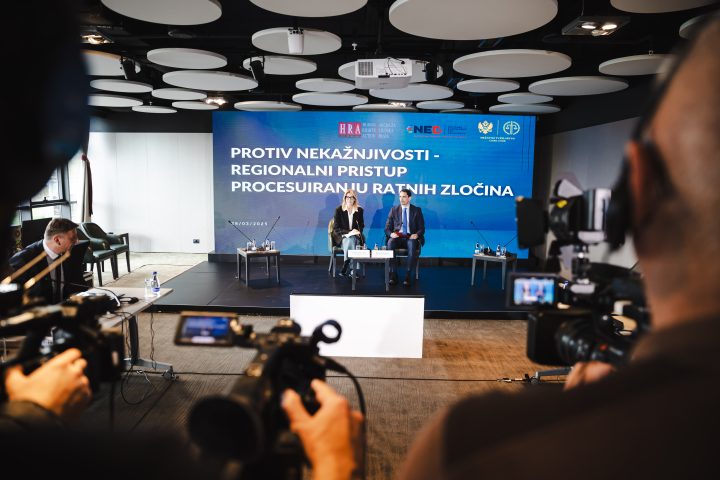
INITIATIVE BY 101 CSOS AGAINST AMENDMENTS TO MEDIA LAWS AIMED AT ESTABLISHING POLITICAL CONTROL OVER RTCG AND THE AGENCY FOR AVM SERVICES
31/03/2025
MONTENEGRO SHOULD ADOPT A REPARATIONS POLICY FOR WAR CRIMES VICTIMS AND ENSURE INVESTIGATIONS BASED ON COMMAND RESPONSIBILITY
02/04/2025MONTENEGRIN STATE PROSECUTION INTENSIFIES EFFORTS ON WAR CRIMES CASES AND ENHANCES INTERNATIONAL COOPERATION

The Special State Prosecutor’s Office has recently adopted a more proactive approach to prosecuting war crimes; however, it needs to provide more transparency regarding its activities, according to preliminary findings from Human Rights Action (HRA) concerning war crimes prosecution in Montenegro over the past two years.
To date, Montenegro has issued final convictions for only 11 individuals related to war crimes committed during the conflicts of the 1990s. This figure represents less than one-third of those indicted across a total of eight cases prosecuted over the past three decades. HRA’s Executive Director, Tea Gorjanc Prelević, highlighted this at the conference titled “Against Impunity – A Regional Approach to War Crimes Prosecution,” organized by HRA in collaboration with the Supreme State Prosecutor’s Office.
Gorjanc Prelević highlighted the disappointing results of the 2015 Strategy, noting that only two cases were prosecuted during its eight-year implementation, both of which were transferred to Montenegro by other countries.
“This underscores the necessity for transparency regarding current efforts,” she emphasized.
Since taking office, Supreme State Prosecutor Milorad Marković has made noticeable strides in addressing impunity for war crimes. Gorjanc Prelević specifically underscored the significance of adopting the new War Crimes Investigation Strategy for 2024-2027, along with its accompanying Action Plan. These documents, developed with HRA’s assistance, for the first time incorporate concrete measures, implementation timelines, and clear success indicators. “This marks a crucial step towards establishing a functional system for prosecuting war crimes, in alignment with prior recommendations from HRA and international organizations monitoring the rule of law in Montenegro,” she stated.
The lack of political will, coupled with a superficial and inadequate approach by both the state prosecution and the judiciary in earlier cases, has resulted in acquittals and a climate of impunity for the most serious crimes, including war crimes. However, it is encouraging that the Special State Prosecutor’s Office will be reviewing these cases this year.
Gorjanc Prelević also noted that the fight against impunity, primarily led by NGOs, has been a topic of discussion for three decades since the end of the wars in Croatia and Bosnia and Herzegovina (BiH), during which time victims of war crimes have been waiting for justice. Citing the report by Serge Brammertz, Chief Prosecutor of the International Residual Mechanism, she emphasized that BiH, Montenegro, and Serbia still need to prosecute more than 1,000 individuals suspected of war crimes. Many of these suspects are not located in the countries seeking them, highlighting the necessity for regional cooperation.
“Unfortunately, Montenegro’s experience illustrates that neither material resources nor time alone are sufficient for prosecuting war crimes. What matters most is the will,” Gorjanc Prelević stressed.
Supreme State Prosecutor Milorad Marković asserted that “the State Prosecution’s approach to war crimes cases is neither politically influenced nor restricted, and its work is not guided by potential political repercussions at the national or international level.”
He emphasized that the State Prosecution has adopted a new strategy that significantly enhances its transparency and openness to the public through increased cooperation with NGOs, more comprehensive reporting, and improved communication.
Marković further noted that this proactive approach has positively impacted both international and regional cooperation, at both the strategic level and in specific cases.
“We have initiated the conclusion of three cooperation agreements concerning the support of witnesses, victims, and survivors to facilitate their participation in war crimes proceedings—with Bosnia and Herzegovina, Serbia, and Croatia—alongside the revision of the Cooperation Agreement on the Prosecution of War Crimes, Crimes Against Humanity, and Genocide with the State Attorney’s Office of the Republic of Croatia.” The agreements with Serbia and Bosnia and Herzegovina were finalized last year, while the agreements with the State Attorney’s Office of the Republic of Croatia are expected to be completed once Croatia finalizes its internal procedures.
Marković also announced that the Montenegrin Prosecutor’s Office will continue to strengthen and promote judicial cooperation in the region while respecting the sovereignty of other states and the principle of mutual recognition in international criminal law cooperation. “The Supreme State Prosecutor’s Office (VDT) and the Special State Prosecutor’s Office (SDT) are fully committed and will remain proactive in building trust between state prosecutor’s offices and enhancing the effectiveness of proceedings in specific cases, both at the international and regional levels,” he stated.
Growing Case Numbers Highlight Need for Increased Transparency
Bojana Malović, Legal Advisor at Human Rights Action (HRA), emphasized that in the past two years, the number of cases handled by the Special State Prosecutor’s Office (SDT) has risen from eight at the end of 2022 to a total of 23 by March 2025. This increase includes the reopening of older cases—such as the Morinj Camp, Refugee Deportation, Bukovica, and Kaluđerski Laz cases—which had been previously inadequately prosecuted.
“To enable the SDT to manage all cases more effectively, both old and new, working groups have been established to develop action plans and prioritize these cases,” said Malović, adding that the results of analyses conducted on the older cases are expected to be published soon.
She also highlighted that only two special prosecutors in Montenegro are currently responsible for war crimes cases, while also managing other cases, leading to an overload of work for them.
“Thirty years have passed since the armed conflicts, and while we understand the challenges within the prosecutor’s office, it is essential—especially for the victims and the public—to see that the prosecutor’s office is actively addressing war crimes cases,” Malović stated.
Malović pointed out that Montenegro previously had a war crimes investigation strategy that was not effectively implemented, inadequately reported, and ultimately served as a mere façade.
“The State Prosecutor’s Office must recognize that, after years of avoiding justice, the current lack of clarity in communicating actions taken in individual cases raises legitimate concerns that the same practices may persist under the new strategy. Therefore, we emphasize the importance of more detailed and concrete reports from both the SDT and the Supreme State Prosecutor’s Office (VDT) in this area,” Malović emphasized.
“This illustrates the prosecutor’s office’s willingness and readiness to cooperate and provide transparent reporting on activities, to the extent possible,” added Vujošević.
According to Malović, while the report from the State Prosecutor’s Office (VDT) on the implementation of the Strategy for Investigating War Crimes indicates that over 84% of the activities outlined in the action plan have been completed, the office acknowledges that much work remains and is open to various forms of cooperation.
Tanja Čolan Deretić, a Special Prosecutor at the SDT, addressed the issue of transparency in war crimes cases, asserting that while the public has the right to know, the prosecutor’s office also has an obligation to protect the integrity of its proceedings.
“Openness could jeopardize the prosecution process because any information released prior to the initiation of proceedings could serve as a signal to potential suspects that they are under investigation, making them more difficult to locate. Additionally, we must ensure that we do not put victims or witnesses at risk,” she emphasized.
She pointed out that, for example, one of the two Montenegrin nationals accused of war crimes in Bosnia and Herzegovina has recently acquired citizenship in another country, in addition to Montenegro, which may render him unavailable for prosecution in Montenegro.
Regional Cooperation: The Only Path to Justice for Victims
Discussing the importance of regional cooperation, Tanja Čolan Deretić emphasized that the International Residual Mechanism for Criminal Tribunals (IRMCT) has established the most effective partnership with Montenegro. She noted that Montenegro lacks evidence of war crimes committed within its own borders, as the events currently under investigation by its prosecutor’s office primarily involve territories of other countries.
“For this reason, we need to obtain data from these nations through international legal assistance,” Čolan Deretić stated.
She specifically praised the cooperation with Bosnia and Herzegovina, highlighting that Montenegro also maintains strong relations with the authorities in Serbia and Kosovo. However, she expressed concerns regarding Croatia’s slow responses to requests for legal assistance. Notably, representatives from the County State Attorney’s Office in Split, responsible for prosecuting war crimes involving perpetrators and victims from Montenegro, communicated in their response to the conference invitation that they did not have the time to participate, even online, this year.
Ivan Matešić, Deputy Chief Prosecutor of the Prosecutor’s Office of Bosnia and Herzegovina and Head of the Special War Crimes Department, emphasized that despite the passage of time, the issue of war crime prosecutions remains a significant topic in public, media, and political discussions.
“Regional cooperation is inevitable and, in practice, the only way to ensure that all suspects, accused, and convicted individuals receive the justice they deserve, and that the victims obtain satisfaction,” Matešić asserted.
He shared that in Bosnia and Herzegovina, 400 individuals have been definitively convicted of war crimes, resulting in approximately 4,000 years of prison sentences. Currently, there are about 20 prosecutors in Bosnia and Herzegovina who specialize in war crimes and do not work on other cases.
Matešić also pointed out that while Bosnia and Herzegovina’s judiciary possesses the necessary expertise, the prevailing political climate presents significant challenges. “International legal assistance is managed through the Ministry of Justice, which is headed by a politician who may not always be inclined to cooperate,” he explained. He further emphasized that “the role of the International Residual Mechanism is crucial, as they advocate for cooperation among the countries of the former Yugoslavia at the highest level; however, even they have limitations in their influence.”
Svetlana Nenadić, Public Prosecutor at the War Crimes Prosecutor’s Office in Serbia, echoed the sentiment that regional cooperation is essential for prosecuting war crimes. “Regional cooperation has experienced fluctuations, largely reflecting the regional political climate,” Nenadić assessed.
She recalled the 2018 initiative by the Serbian prosecution to create a regional database of all war crimes trials, which aimed to harmonize the practices of all courts and war crimes panels. According to her, had this initiative been implemented, it could have produced outstanding results.
Nenadić also noted that regional cooperation faces not only factual challenges—such as time constraints, the passing of lives, fading memories, and differing procedural laws across the Western Balkans—but also significant political hurdles.
“These challenges undermine the fragile cooperation on war crimes, both formally, in terms of issues like extradition, and substantively, through rhetoric that can be highly inflammatory at the regional level. The destructive legacy of the past can exacerbate societal tensions that also impact the judiciary,” Nenadić concluded.
Ilir Morina, the prosecutor at the Special Prosecution of Kosovo and head of the Department for War Crimes Investigation, asserted that the principle of the Geneva Conventions, “Never Again,” can only be realized through regional collaboration. He emphasized the strong cooperation with Montenegro and Croatia but highlighted a lack of cooperation with Serbia and the Mechanism.
“If we don’t cooperate, there will be no shared future. That’s why we must work together and combat impunity through joint efforts,” Morina stressed.
Jelena Đokić Jović, a trial monitor for war crimes at the Center for Peace Studies in Zagreb, also addressed the insufficient level of cooperation from Croatia regarding these cases. “Unfortunately, cooperation is very limited and primarily restricted to witness testimonies via video link,” she stated.
She pointed out a significant increase in trials in absentia, noting that this trend became particularly noticeable after Croatia’s accession to the EU, especially following 2017. “Almost 40% of trials are currently being held in absentia. This trend emerged shortly after Croatia joined the EU, despite its commitment to eliminate this type of trial upon accession,” Đokić Jović observed, emphasizing the unreasonable length of criminal proceedings, which undermines the principles of legal certainty and the rule of law.
Varying Levels of Cooperation Between Prosecutor’s Offices and NGOs in the Region
Bojana Malović, legal advisor at Human Rights Action (HRA), emphasized that the success of the civil sector in realizing its full potential hinges on the leadership of institutions responsible for prosecuting war crimes.
“In recent years, we have been fortunate to have leaders at the helm of both the Special State Prosecutor’s Office (SDT) and the State Prosecutor’s Office (VDT) who exhibit genuine openness to collaborating with NGOs. This partnership primarily focuses on executing joint initiatives, organizing meetings, and conducting training sessions aimed at enhancing the capacity of the prosecution offices,” she noted.
However, Malović stressed that Montenegro still lacks a functional and sustainable mechanism to provide systemic support to victims and witnesses. “It seems that the full potential of the NGO sector has yet to be harnessed, particularly in encouraging victims and witnesses to step forward and testify. This includes preparing them for hearings and providing post-trial support to help them navigate the entire process with minimal trauma. Establishing this support system should be a priority,” she asserted.
Jovana Kolarić, project coordinator at the Humanitarian Law Center (HLC) Serbia, pointed out a decline in cooperation with the War Crimes Prosecution since 2017, when Snežana Stanojković took over from the retired public prosecutor for war crimes, Vladimir Vukčević. She explained that communication between the prosecution and the public has since deteriorated.
Kolarić highlighted that, over the past decade, the War Crimes Prosecution in Serbia has filed 65 indictments, 36 of which were transferred from Bosnia and Herzegovina. As a result of its own investigations, Serbia’s prosecution has averaged only three indictments per year.
“We simply cannot discuss the effectiveness of the prosecution’s work. The reasons for this inefficiency can be both objective—such as a lack of human and technical resources—and subjective, particularly when segments of the prosecution act in alignment with public expectations, especially regarding the protection of Serbia’s police or military structures,” Kolarić explained.
She emphasized that these issues should be addressed through strategic documents that provide civil society with measurable tools to assess the effectiveness of state institutions in handling cases.
Bekim Bljakaj, Executive Director of the Humanitarian Law Center in Kosovo, noted that the situation in Kosovo differs fundamentally from that in Serbia. “Since 2015, when jurisdiction over these cases was transferred to the domestic judiciary, cooperation with the civil sector has improved,” Bljakaj stated, adding that the prosecution also respects the recommendations from the annual reports published by the Center.
He pointed out that a key issue remains the lack of cooperation between the Kosovo prosecution and the prosecution in Serbia. As he explained, the fact that victims and perpetrators are often located in different territories complicates the prosecution of crimes in the presence of those who committed them. “The absence of cooperation between both sides creates opportunities for impunity and violations of victims’ rights. This is a political issue that must be resolved,” Bljakaj asserted.
In Bosnia and Herzegovina, the cooperation with the state prosecution is also considered satisfactory, according to Samra Čardaković, legal advisor for TRIAL International’s office in Bosnia. She highlighted the challenge of lengthy proceedings, particularly regarding the time it takes to initiate the prosecution of war criminals. However, she emphasized that the civil sector understands the numerous challenges faced by the prosecuting authorities in Bosnia.
“Therefore, the focus—not only in Bosnia but across the entire region—should be on insisting on regional cooperation and improving the existing mechanisms of cooperation, especially in the context of protecting victims. This is also one of the requirements for EU accession,” she emphasized.
Samra Čardaković also emphasized the importance of granting victims’ property claims (compensation) during criminal proceedings, noting that this protects them from re-victimization, prevents the exposure of their identities in civil suits, and alleviates the burden of prolonged litigation, which often lasts for years.
Jelena Đokić Jović from a Documenta described the organization’s cooperation with the prosecution as largely superficial, consisting mainly of formal exchanges in which inquiries are sent and responses are provided.
“Cooperation used to be more meaningful, but that was a long time ago, before Croatia joined the EU,” she remarked.
She stressed that genuine political will is essential for effective war crimes prosecution. “Civil society must continue to advocate for progress and demand accountability, applying consistent pressure through reports and advocacy,” Đokić Jović emphasized.
The regional conference was organized as part of the project “Enhancing Transitional Justice in Montenegro,” implemented by HRA with support from the National Endowment for Democracy (NED).
Photographer: Filip Roganović






















































 English
English